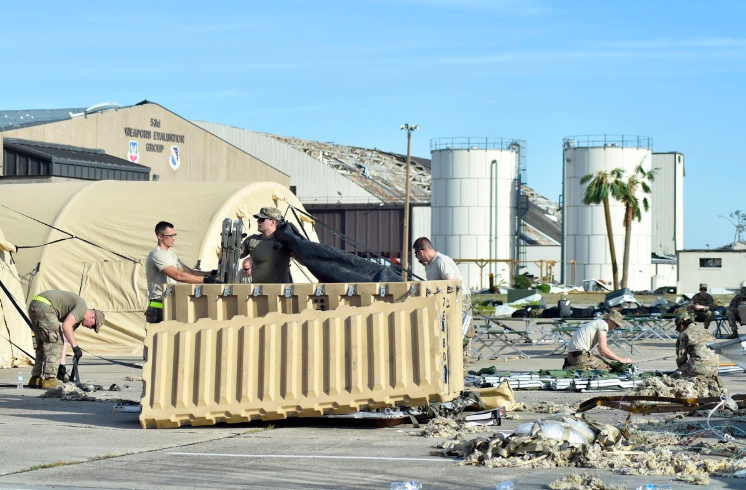
Tyndall Air Force Base Shortly After Hurricane Michael Destroyed It. Photo: Tech. Sgt. Liliana Moreno, Air Force
The military is struggling to cope with a series of climate change related disasters and other environmental health and safety emergencies. Defense News reported yesterday that funding ran out yesterday for relief efforts at Tyndall Air Force Base related to Hurricane Michael, which prevents the start of all new work and puts more than 120 projects planned to begin after May 1 on hold indefinitely. Disaster funding is stuck in Congress because the President insists that it not include more funds for Puerto Rico’s hurricane damage.
- As a result, due to damage sustained at Tyndall and Offutt Air Force Base (as a result of flooding), which are in addition to other building maintenance issues, have created a $4 billion shortfall this year.
- Without additional funds, money that funds Air Force operations will have to be shifted away from its intended purposes creating with Defense News characterized as a “cash crunch” that jeopardizes readiness.
- Specifically, without the disaster funding, the Air Force will have to ground combat aircraft, defer at least 61 facility repair projects at various bases and halt certain aircraft maintenance actions.
These funding needs are in addition to other issues surrounding military housing and health care costs for servicemembers made ill by “burn pits” in the U.S., Iraq, and Afghanistan that resulted in their dangerous exposure to toxic chemicals. House members are insisting on adding $140 million to construction budgets to address the housing hazards, and lawmakers in both the House and the Senate are urging that Congress take action to support the 173,000 servicemembers exposed to toxic burn pits that have been linked to a long list of serious illnesses.
- The housing legislation would address, according to Defense News, “issues ‘such as mold, vermin, and lead in military family housing.’ The topic has been a major focus of both chambers in recent months since news reports emerged about serious problems at privatized military housing across the country.”
- Stars and Stripes reported Tuesday that the burn pits disposed of trash, human waste, petroleum, rubber, and other debris and those fires released hazardous smoke into the air which exposed nearby troops who have attributed medical conditions, such as respiratory issues and cancer, to the toxic fumes.
Why This Matters: Climate change destruction and the impacts of exposure of servicemembers and their families to toxic chemicals are issues that the military must deal with now, or else our nation’s readiness and the health and safety of military servicemembers and their families will be unduly at risk. And we have not even mentioned the PFAS contamination of drinking water at dozens of installations — that will cost billions to clean up. Congress should make correcting all these issues a higher priority. And these funds should not be held hostage to unreasonable demands to DENY similar disaster relief to other American citizens who are being penalized just because they live in Puerto Rico.
May 2, 2019 » burn pits, climate change, Flooding, Hurricane Michael, lead, mold, Offutt Air Force Base, Puerto Rico, toxic chemicals, Tyndall Air Force Base


